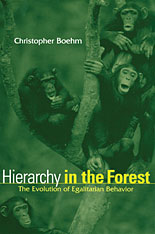LiteratureBase
Hierarchy in the Forest. The Evolution of Egalitarian Behavior
Boehm, C. (1999). Hierarchy in the Forest. The Evolution of Egalitarian Behavior. Cambridge, MA, USA: Harvard University Press.
Abstract
- Are humans by nature hierarchical or egalitarian? Hierarchy in the Forest addresses this question by examining the evolutionary origins of social and political behavior. Christopher Boehm, an anthropologist whose fieldwork has focused on the political arrangements of human and nonhuman primate groups, postulates that egalitarianism is in effect a hierarchy in which the weak combine forces to dominate the strong. The political flexibility of our species is formidable: we can be quite egalitarian, we can be quite despotic. Hierarchy in the Forest traces the roots of these contradictory traits in chimpanzee, bonobo, gorilla, and early human societies. Boehm looks at the loose group structures of hunter-gatherers, then at tribal segmentation, and finally at present-day governments to see how these conflicting tendencies are reflected. Hierarchy in the Forest claims new territory for biological anthropology and evolutionary biology by extending the domain of these sciences into a crucial aspect of human political and social behavior. This book will be a key document in the study of the evolutionary basis of genuine altruism.
- Concepts Autonomy, Cooperation, Equality, Fairness, Hierarchy, Moral cognition
- Relevant learning goals Cooperation Competency, Evolutionary Thinking
- Relevant subject areas Biology, Civics, Ethics, Human Evolution, Interdisciplinary, Politics, Social Studies
- Relevant research methods Knowledge synthesis


